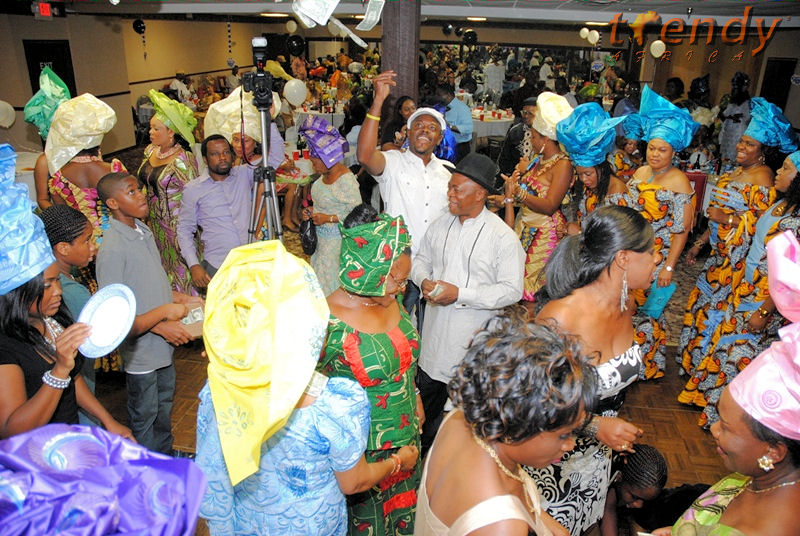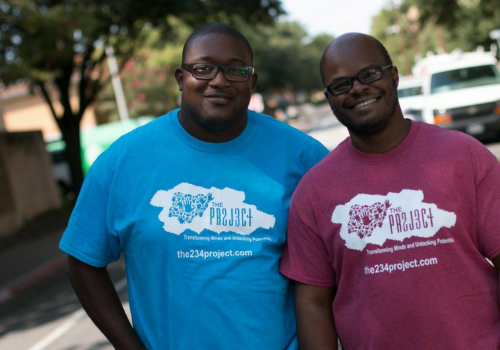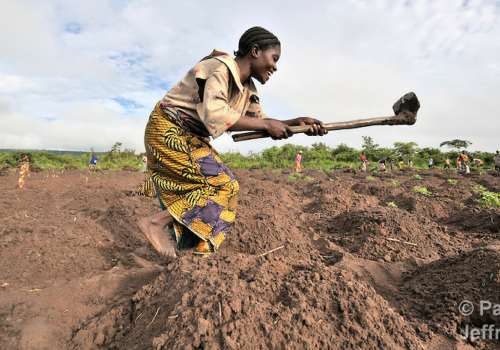
It was 12:31 am and the party had just started. The striking smell of jolof rice, ugba, and okporoko were in the air. The sterling sight of colorful African wrappers and head-ties with matching accessories filled the party hall. And the streaming sounds of laughter and cameras flashing blended in nicely with the music. Behold the power of an Igbo celebration!
Some minutes later, the master of ceremony, MC Igbo Kwenu, noticed that the guests of honor, Chief Dr. and Mrs. Owerri One, had just walked in. So he proceeded to invite them to the high table. The high table was positioned at the opposite end of the entrance to the party hall. As Chief Dr. and Mrs. Owerri One slowly danced their way to the high table, MC Igbo Kwenu gave a signal to the disc jockey of the party, DJ Bongo Music.
Upon seeing the signal from MC Igbo Kwenu, DJ Bongo Music methodically switched from the song “Ihe Oma” by Oriental Brothers International to the song “Diamond” by Ababanna. The old generation meets the new generation. This was no ordinary party. This was everybody’s party. This was a party about cultural celebration and patriotic progress powered by Bongo music.
Brief History of the Igbo People
The power of Bongo music electrifies the historical connection of all Igbo people. Igbo people can trace their origin to around 5000 B.C. according to evidence from musical artifacts and other elements. Early Igbo people set up a way of life that was based on the periodic observation of certain cultural festivities, and many of these festivities involved the use of storytelling accompanied by instruments such as drums and gongs. These instruments played a key role in shaping traditional Igbo music for centuries.
In the 20th Century, the world became more integrated especially after the founding of the United Nations. People from different parts of the world were linked together in new ways, and Igbo people began to add their voices to this new world order. The mix of people also led to a mix of music. Traditional musical instruments like drums were united with modern musical instruments like electric guitars— new sounds were created and Bongo music was born. Bongo music became a primary way to preserve traditional Igbo musical elements in a changing world.
As cultures mixed across the world, the desire for cultural identity ironically became louder. In Africa, this led to a wave of independence from colonial rule and a number of civil wars. After 1970, following the Nigerian Civil War, aka the Nigerian-Biafran War, many Igbo people left their homeland in southeastern Nigeria due to the war’s devastation. Some of these Igbo people ended up in other parts of Nigeria like Lagos and Port Harcourt. Some ended up in other parts of Africa like Ghana and Cameroon. And several left the continent altogether and moved to countries such as the United Kingdom and the United States. Today in the United States, prominent Igbo communities are still trying to establish a home away from home in cities such as Atlanta, Baltimore, Chicago, Dallas, Houston, and New York.
What connects contemporary Igbo communities across the world is still the observation of certain cultural festivities powered by Bongo music. And by popular demand, BongoLife.com is taking this connection to a higher level.
From celebrating the birth of a child in London to honoring the chieftaincy title of an elder in Lagos, from recognizing the accomplishment of a businessman in Abuja to highlighting the service of a church foundation in Atlanta, BongoLife.com brings stories to life through non-stop access to Bongo music.
Good life stories are worthy of good parties, and BongoLife.com is an ongoing party.
Founder’s Bio
Home is where the heart is, and the founding of BongoLife.com is a story about going with your heart. Patrick C. Nkwopara Jr., founder of BongoLife.com, moved from Nigeria to the United States with his family when he was six years old. He didn’t know a word of English when he arrived in the US and subsequently faced some struggles through elementary school.
Nevertheless, he was determined to get a good education, and his determination led him to play football in high school. In his time at South Grand Prairie High School, Patrick became one of the nation’s best linebackers, which earned him an athletic scholarship to the University of Texas at Austin.
During his time as an athlete at UT Austin, Patrick would try to incorporate Bongo music into his workouts and pre-game warm-ups as opposed to other more mainstream forms of music. Bongo music inspired him and made him feel at home, but getting access to it always proved difficult. Online media sites like iTunes and YouTube were of little help, so Patrick took matters into his own hands.
He pooled resources from family and friends and created BongoLife.com in September 2011, and an accompanying Facebook page, Bongo Owerri in January 2010. Now averaging thousands of web visits and hundreds of downloads, BongoLife.com has truly arrived. In many ways, Patrick’s story is the story of numerous Nigerians in the Diaspora – one of determination, one of accomplishment, and one of just trying to find some good music for inspiration.
So what makes a good Igbo party?
How about some inspirational music, good people, and an easy-to-find location?
BongoLife.com has all three! BongoLife.com features:
•Top-quality musical downloads, videos, and live streams
•Artist profiles, pictures, blog, and news
•Booking services, concerts, and community events
•Online music store
•Nutrition and health products
Upcoming website features include an online community forum and member profile pages. For more, visit BongoLife and BongoLife Health Products.




